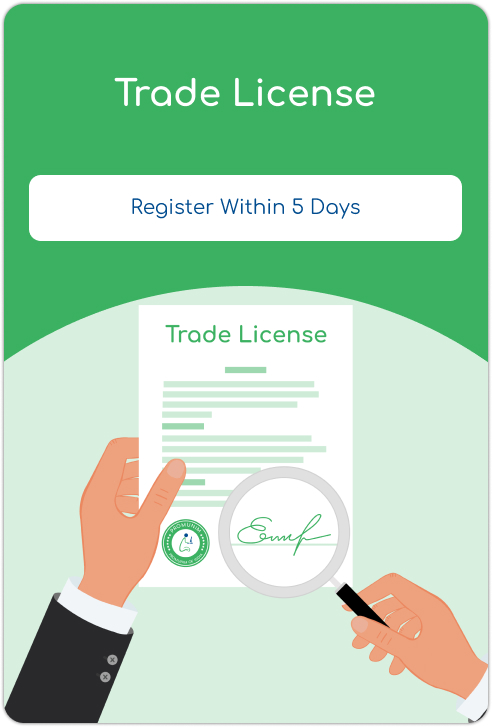
Trade License
1147 customers "Elevate your business's tax compliance journey with effortless TAN Registration."

What will you get?
- Charges INR.4500
- Individual / Startup/
Small Enterprise - Charges INR.9000
- other cases
What do we Require?
INR 6117 Taxes As Applicable

Business Address Proof

Rent agreement

Refrigerator Bill

Plan layout of premises in a blueprint

Affidavit

Identity Proof

Address Proof

Property Ownership Proof

Occupancy Certificate

Business Registration Certificate

No Objection Certificate (NOC)

Fire Safety Certificate

Health and Sanitation Clearance

Other Licenses and Permits
Introduction
A trade license is an official document or permit issued by the local municipal corporation or governing authority that authorizes individuals, businesses, and traders to carry out specific commercial activities within a designated area. It serves as a legal requirement to ensure compliance with local regulations and zoning laws governing commercial operations.
Who Can Apply for Trade License?
- Business Entities:Sole Proprietorships: Individuals operating businesses on their own can apply for a trade license.
- Partnerships: Partnerships consisting of two or more individuals can apply for a trade license under the partnership name.
- Limited Liability Partnerships (LLPs):LLPs engaged in commercial activities require a trade license for their operations.
- Private Limited Companies:Companies registered as private limited entities need a trade license for their commercial activities.
- Public Limited Companies:Similarly, public limited companies must obtain a trade license to conduct business.
- Individual Entrepreneurs:Individual entrepreneurs, freelancers, and self-employed professionals engaged in commercial activities such as consulting, freelancing, or service provision may require a trade license depending on local regulations.
- Retailers and Traders:Retailers operating shops, stores, supermarkets, or other retail outlets selling goods or merchandise may need a trade license from the local Municipal Corporation or governing authority.
- Manufacturers:Manufacturing units involved in the production of goods or products, including factories, workshops, and industrial establishments, typically require a trade license for their operations.
- Service Providers:Service providers offering various services such as salons, repair shops, restaurants, hotels, hospitals, educational institutions, and entertainment venues may need a trade license as per local regulations.
- Contractors and Construction Firms:Contractors, builders, and construction firms undertaking construction activities, renovation work, or infrastructure projects may require a trade license for their operations.
- Government Agencies and Organizations:Government departments, agencies, and organizations involved in commercial activities, such as operating markets, organizing events, or providing services, may need a trade license.
- Non-Profit Organizations:Non-profit organizations, charitable trusts, and social welfare institutions engaged in commercial activities, fundraising events, or revenue-generating initiatives may require a trade license depending on local regulations.
Key Factors:
- Legal Authorization:Trade license grants legal authorization to conduct commercial activities, ensuring compliance with regulatory standards and municipal bylaws.
- Regulatory Compliance:Obtaining a trade license demonstrates adherence to local regulations, safety standards, and zoning laws applicable to commercial establishments.
- Periodic Renewal:Trade licenses are typically issued for a specific period and require periodic renewal to continue operating legally, thereby promoting on-going compliance with regulatory requirements.
- Inspection and Monitoring:The issuance of trade licenses involves inspection and monitoring by municipal authorities to verify compliance with prescribed norms and standards.
Benefits:
- Credibility and Legitimacy:Holding a trade license enhances the credibility and legitimacy of businesses, instilling confidence in customers, clients, and stakeholders.
- Avoidance of Penalties:Compliance with trade license requirements helps businesses avoid penalties, fines, or legal consequences for operating without proper authorization.
- Access to Government Support:Trade license holders may be eligible for various government schemes, subsidies, and support programs aimed at promoting business growth and development.
- Consumer Protection:Trade license ensures consumer protection by ensuring that businesses operate in accordance with established standards and regulations, thereby safeguarding public health and safety.
Objectives:
- Ensure compliance with local regulations and zoning laws governing commercial activities.
- Promote transparency and accountability in business operations.
- Facilitate economic growth and development by providing a conducive environment for commercial enterprises.
- Protect public health, safety, and welfare by regulating commercial establishments and activities.
Document Requirements:
The documents required for obtaining a trade license may vary depending on the jurisdiction and the nature of the business. Commonly required documents include:
- Proof of identity and address of the business owner or proprietor.
- Proof of property ownership or rental agreement for the business premises.
- Affidavit affirming partnership deed accuracy
- Building plan approval and NOC (No Objection Certificate) from relevant authorities.
- Fire safety certificate and health department clearance, if applicable.

